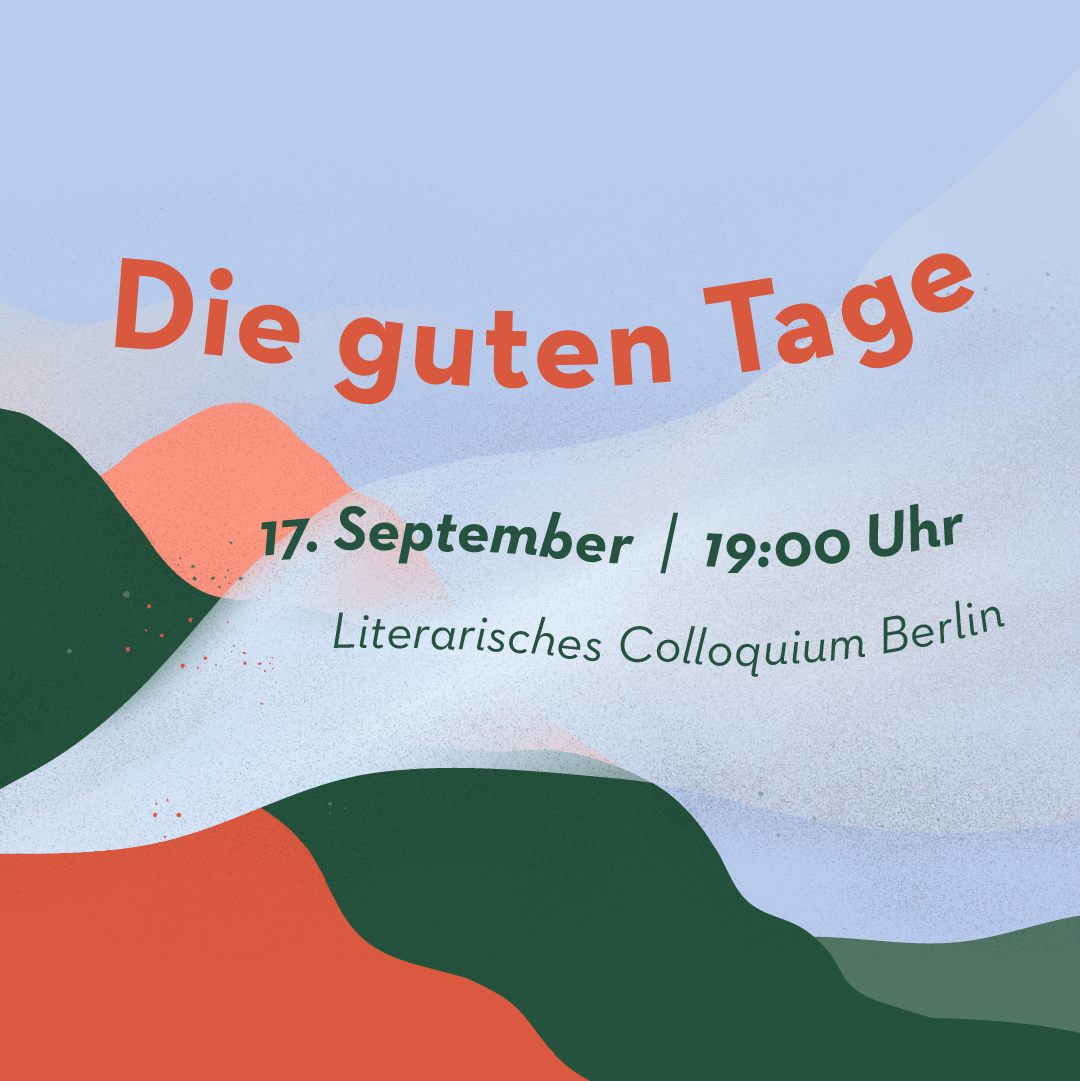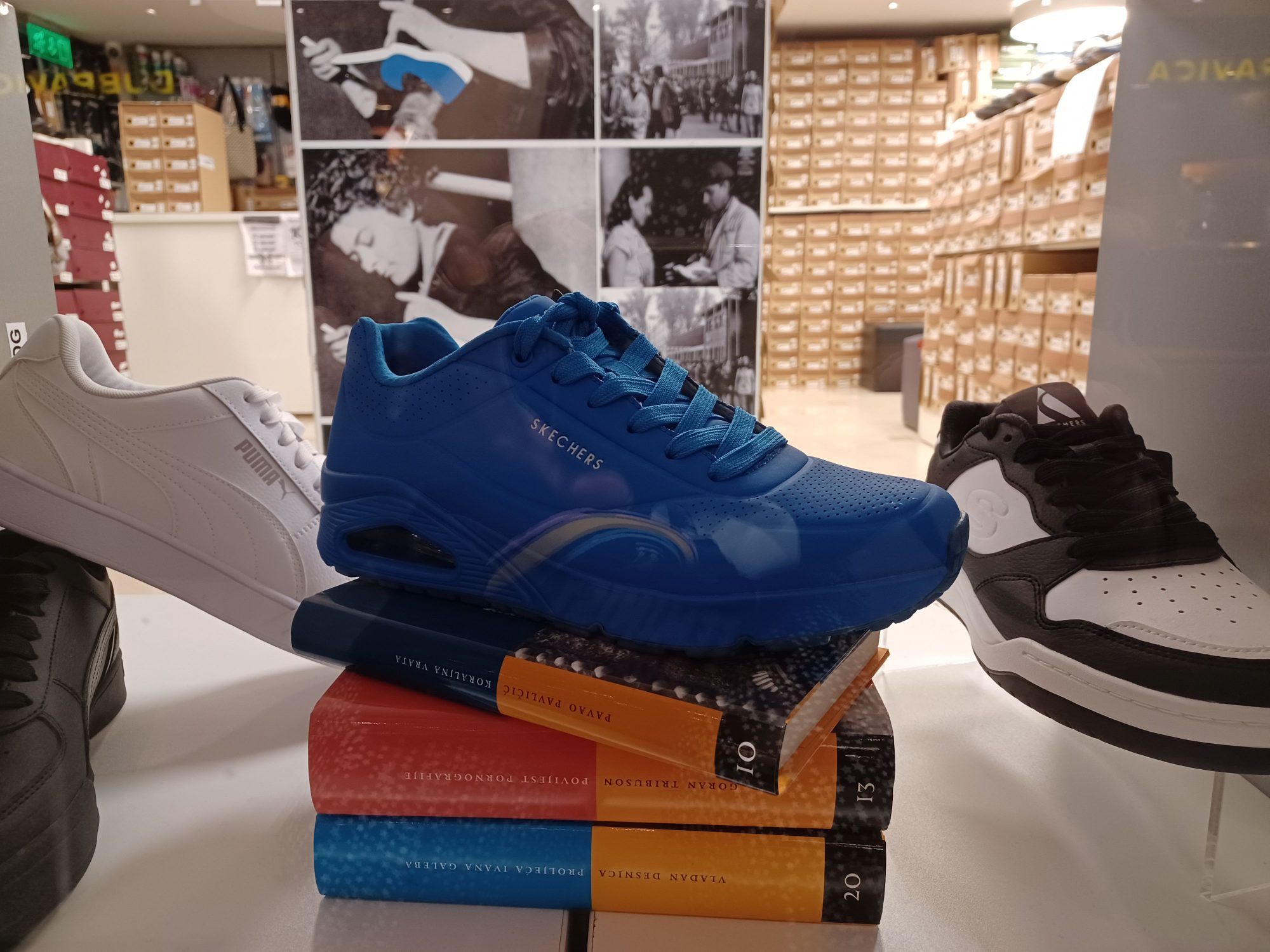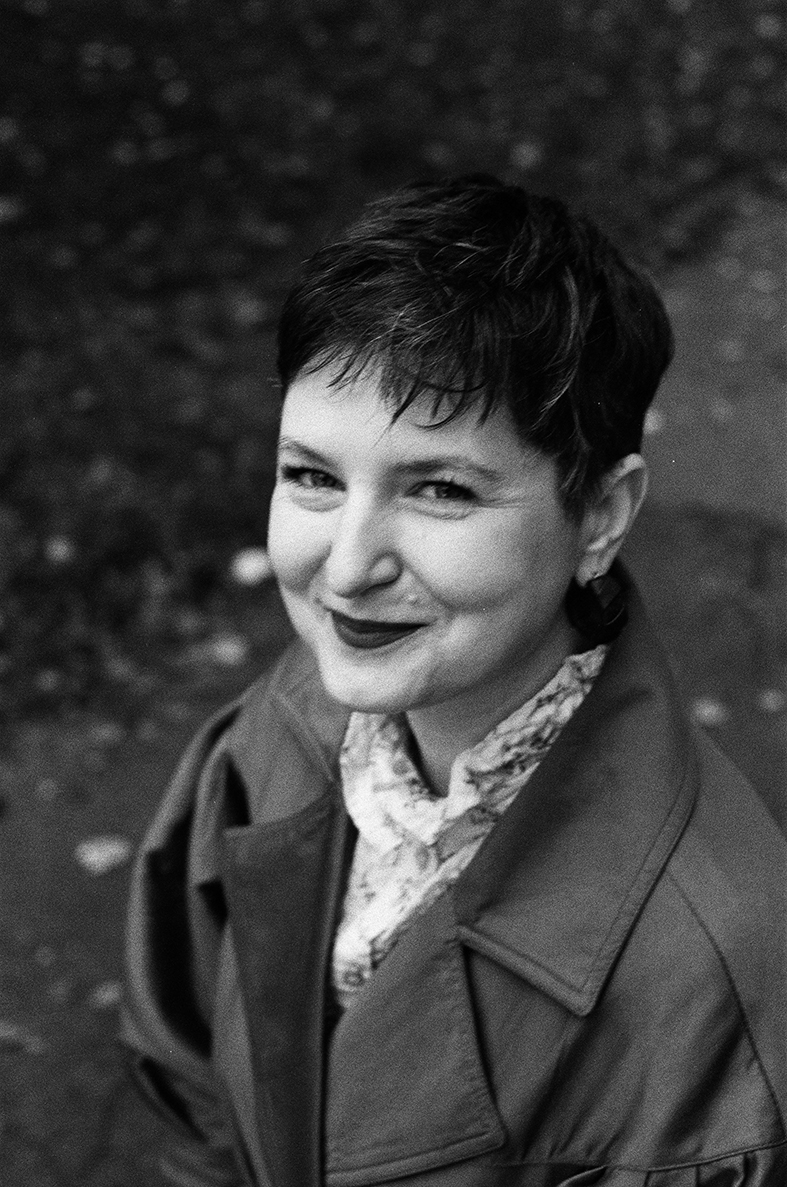Reading With Our Feet
Here it is, a storefront realization of an old folk saying: Tko nema u glavi, ima u nogama, meaning: An empty-head uses his feet instead. My translation might be a tad inspired, elliptical even, but it’s true nonetheless: scatterbrains do the same things twice. Let’s look at the picture. They’ve arranged three Croatian literary classics into a neat little staircase. Do they want us to reach higher knowledge? Nirvana? Highschool or college degree? No. They want us to buy Skechers, a shoe brand. Puma is also an option. Lots and lots of color-coordinated options here, not all of them pictured. Obviously, novels are turned upside down, because in this reality everything is twisted, so that the proverbial feet can fit the shoes. Everything is about selling us that footwear. Even literature. But here’s the catch. These books were originally published and sold by Croatian right-wing newspapers in large quantities, at the same exact time another liberal (nowadays right-wing) publication sold its editions in large quantities. Now, twenty years later, you can find them everywhere for a bargain. Shoes are expensive. These books are not. They are a cheap backdrop to a dwindling Croatian literature, and rising cost of living. These books were never meant to be anything but a cash grab, and it didn’t shock me at all to find them displayed this way. These sneakers were ugly to begin with, but the placement of Croatian novels makes them look even worse. It cheapens them by association. How, you may ask, does a classical book cheapen a novelty shoe? Well, when a book is only meant to be a stepping stone to enrich a corporate birdbrain, that same book can symbolically, and literally also be used to sell some overpriced trainers, thus enriching another corporate birdbrain. It’s quite simple, really: if books are just another product, like shoes, for example, it doesn’t matter if they’re placed upside down or not. We’re expected to read them with our feet anyway.
Čitati nogama
To je, dakle, otjelovljenje famozne narodne izreke: Tko nema u glavi, ima u nogama. Stojim pred izlogom. Ovo je slika: tri su hrvatska književna klasika aranžirali u maleno stepenište. Žele da tim improviziranim stubama dosegnemo više znanje? Nirvanu? Srednjoškolsku ili univerzitetsku diplomu? Ne. Hoće da kupimo Skechers, marku obuće. Puma nam je također dostupna. Mnogo nam je opcija ponuđeno, iako nisu sve prikazane ovom fotografijom. Očekivano, boje hrbata i cipela pomno su usklađene. Romani su, naravno, okrenuti naopako jer sve je u ovoj stvarnosti izokrenuto naglavačke kako bi stopalo bolje uleglo između redova. Sve je ovdje podređeno prodaji te izložene obuće. Čak i književnost. No postoji jedna kvaka. Te su knjige izvorno objavile i prodavale hrvatske desničarske novine u ogromnoj nakladi, istovremeno kad je i konkurentsko, liberalno (danas desničarsko) glasilo prodavalo svoja masovna izdanja na trafikama. Danas, dvadeset godina kasnije, iste te naslove možete naći svugdje, za siću. Obuća je skupa. Ove knjige nisu. One su jeftina kulisa hrvatske tragedije: vrijednost književnog djela pada; troškovi života rastu. Spomenute su knjige štancane da nekome lako zarade novac. Uopće me nije začudilo što sam ih zatekla ovako, u izlogu. Tenisice iz izloga ružne su same po sebi, ali to kako su ih smjestili kraj hrvatskih romana samo je dodatno istaknulo tu ružnoću. Blizina knjiga čini da izgledaju još gore, da djeluju jeftino. Kako, pitate se, knjiga može umanjiti vrijednost novih cipela? Pa fino. Kad je jedina uloga knjige da bude stepenica u bogaćenju nekog korporativnog tupana, ista ta knjiga može (simbolično i doslovno) poslužiti da nagrdi i proda par precijenjenih tenisica i tako obogati nekog drugog korporativnog tupana. Stvar je, dakle, vrlo jednostavna: ako su knjige samo još jedan proizvod u nizu, kao recimo cipele, onda je posve nevažno jesu li okrenute naopako ili ne. Ionako se od nas očekuje da ih čitamo nogama.
Mit den Füßen lesen
Da ist es, die Realisierung eines alten Sprichworts in Form einer Schaufensterdekoration: Tko nema u glavi, ima u nogama, im Deutschen: Was man nicht im Kopf hat, hat man in den Beinen. Die einen sprechen von Füßen, die anderen von Beinen, meinen tun beide dasselbe: Ein verstreuter Kopf macht alles zweimal. Werfen wir einen Blick auf das Bild. Drei Klassiker der kroatischen Literatur, übereinander gestapelt zu einer hübschen kleinen Treppe. Sollen wir etwa höheres Wissen erlangen? Nirwana? Einen Hochschul- oder Uniabschluss? Nein. Wir sollen Skechers kaufen, eine Schuhmarke. Puma ist auch eine Option. Es gibt jede Menge farblich abgestimmte Varianten, nicht alle sind auf dem Bild zu sehen. Die Romane stehen natürlich Kopf, denn in dieser Realität ist alles verkehrt herum, sodass die sprichwörtlichen Füße in die Schuhe passen. Alles dreht sich darum, uns Schuhe zu verkaufen. Sogar die Literatur. Aber hier ist der Haken. Ursprünglich wurden diese Bücher von rechten kroatischen Zeitungen veröffentlicht und in großen Mengen verkauft, und zwar genau zu dem Zeitpunkt, als eine andere liberale (heute rechte) Publikation ihre Ausgaben der Bücher ebenfalls in großen Mengen verkaufte. Heute, zwanzig Jahre später, kriegt man sie überall zum Spottpreis. Schuhe wiederum sind teuer. Diese Bücher sind es nicht. Sie stellen eine billige Kulisse dar für die schrumpfende kroatische Literatur und die steigenden Lebenshaltungskosten. Diese Bücher waren nie für etwas anderes bestimmt als Geldmacherei, und es hat mich nicht im Geringsten schockiert, sie so ausgestellt zu sehen. Diese Turnschuhe waren sowieso schon hässlich, aber die Tatsache, dass kroatische Romane Teil ihrer Präsentation sind, macht es noch schlimmer. Durch die Assoziation wirken sie billiger. Wie lässt ein klassisches Buch einen neuen Schuh billiger aussehen?, könnte man jetzt fragen. Naja, wenn ein Buch nur als Sprungbrett zur Bereicherung eines corporate Spatzenhirns dient, kann dasselbe Buch symbolisch und buchstäblich auch dazu benutzt werden, überteuerte Turnschuhe zu verkaufen, womit sich dann ein anderes corporate Spatzenhirn bereichert. Es ist eigentlich ganz einfach: Wenn Bücher nur ein weiteres Produkt sind, wie zum Beispiel Schuhe, spielt es keine Rolle, ob sie auf dem Kopf stehen. Man erwartet ohnehin, dass wir sie mit den Füßen lesen.
Übersetzung: Hannah Pöhlmann
Teilen
-
17 Freitag
19:00 UhrDie guten Tage III
Literatur und Musik aus dem Südosten Europas
Mit Asja Bakić, Lana Bastašić und Rumena Bužarovska
Moderation: Irina Bondas, Ismar Hačam und Hanne Reinhardt
Konzert: Hashima
Veranstaltungen mit Asja Bakić
2021
September












